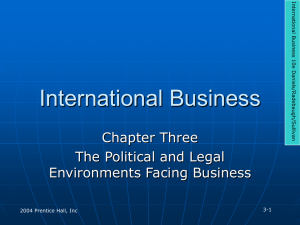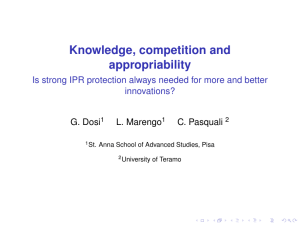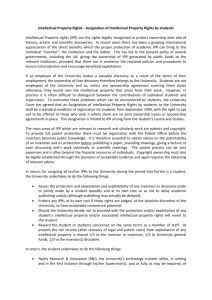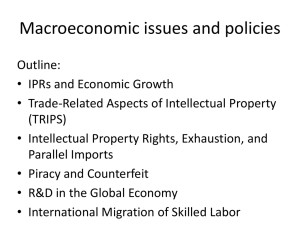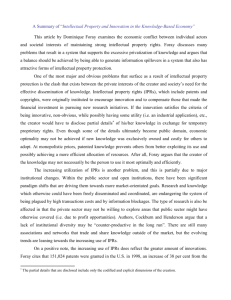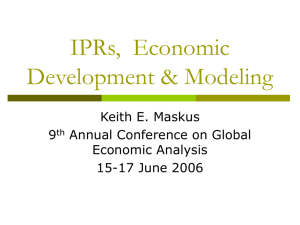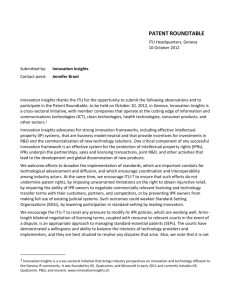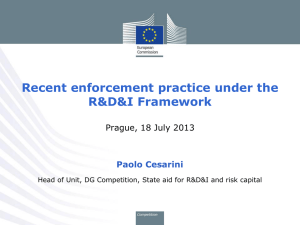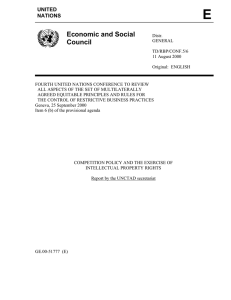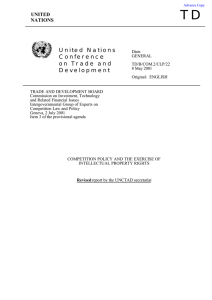Standards, IPRs and Interoperability
advertisement
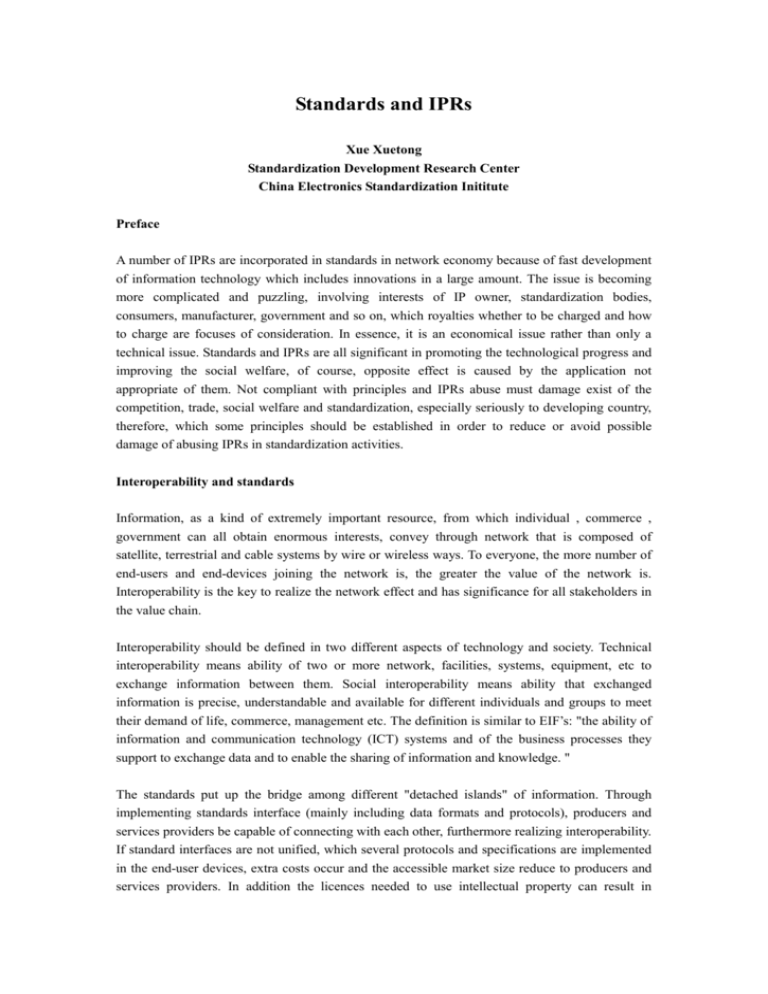
Standards and IPRs Xue Xuetong Standardization Development Research Center China Electronics Standardization Inititute Preface A number of IPRs are incorporated in standards in network economy because of fast development of information technology which includes innovations in a large amount. The issue is becoming more complicated and puzzling, involving interests of IP owner, standardization bodies, consumers, manufacturer, government and so on, which royalties whether to be charged and how to charge are focuses of consideration. In essence, it is an economical issue rather than only a technical issue. Standards and IPRs are all significant in promoting the technological progress and improving the social welfare, of course, opposite effect is caused by the application not appropriate of them. Not compliant with principles and IPRs abuse must damage exist of the competition, trade, social welfare and standardization, especially seriously to developing country, therefore, which some principles should be established in order to reduce or avoid possible damage of abusing IPRs in standardization activities. Interoperability and standards Information, as a kind of extremely important resource, from which individual , commerce , government can all obtain enormous interests, convey through network that is composed of satellite, terrestrial and cable systems by wire or wireless ways. To everyone, the more number of end-users and end-devices joining the network is, the greater the value of the network is. Interoperability is the key to realize the network effect and has significance for all stakeholders in the value chain. Interoperability should be defined in two different aspects of technology and society. Technical interoperability means ability of two or more network, facilities, systems, equipment, etc to exchange information between them. Social interoperability means ability that exchanged information is precise, understandable and available for different individuals and groups to meet their demand of life, commerce, management etc. The definition is similar to EIF’s: "the ability of information and communication technology (ICT) systems and of the business processes they support to exchange data and to enable the sharing of information and knowledge. " The standards put up the bridge among different "detached islands" of information. Through implementing standards interface (mainly including data formats and protocols), producers and services providers be capable of connecting with each other, furthermore realizing interoperability. If standard interfaces are not unified, which several protocols and specifications are implemented in the end-user devices, extra costs occur and the accessible market size reduce to producers and services providers. In addition the licences needed to use intellectual property can result in significant costs if several standards have to be supported at the same time. Therefore, development of standard interfaces should put interoperability as a fist priority, and finalize a single or very few standards. IPRs and standards Intellectual property law is able to create an environment which nurtures dynamism and encourage innovation trough protecting creation of the mind such as inventions, literary and artistic works, software, symbols, names, images and designs used in commerce. Another purpose of intellectual property protection is to secure commercial rewards by granting of time-limited monopolies to the investor. There is a fundamental conflict between broad IPRs (the exclusive rights granted by patent/copyright/trademark law) and the necessity of interoperability in the digital economy. Therefore, it is possible of damaging interoperability to incorporate IPRs to standards. The great majority standard-setting organizations (“SSO”) generally implement “RAND/FRAND-based intellectual property rights policies”, where members either commit or be expected to license their Essential IPR on fair, reasonable and non-discriminatory terms or “royalty free” undertaking, where standard participants voluntarily go further than “RAND/FRAND” and commit to license their Essential IPR on royalty free terms. But " RAND/FRAND " terms has defect easy to be misunderstood , misused, abused in practice Because they are ambiguous and not concrete, for example: (1) SSO member’s failure to disclose, or late IPR disclosure, or incomplete IPR disclosure. IPR owners are not always willing or able to disclose timely the existence of a potentially essential IPR during the early stages of the definition of a standard, and may not timely disclose even after the standard has been defined. Even if IPR is disclosed in time, some patentees do not identify their patents because of the patent application’s having not yet been published. There are cases of deliberate concealment of patents, which in the US have led to Dell Computer and Rambus v. Infineon cases. (2) Prevention, restriction or distortion of competition in maket In general, commercial standards groups have an incentive to broaden their membership so as to achieve network effects, but do not always admit everyone, restricting competition by setting membership conditions. The IPRs holders may reach agreements of commercial collusion, collective boycotts and market allocation, using standards as some provisions of a broader restrictive agreement aimed at excluding actual or potential technologies and competitors, which reduce diversity of product and technology. (3) Dominance and abuse The more complex the standard and the more advanced the development work and implementation, the greater the switching costs for the SSO and the implementers, and the greater the chance of an existing of dominance, especially after a standard is adopted. In light of EC Commission’s opinion, once a standard is adopted, and (a) the standard is de facto or de jure mandatory or (b) standard-compliant products represent more than 40% of the downstream market, the provider of an essential patent is likely to be found dominant in its technology market. If at that stage it enforces or continue to enforce its patent rights, the question arises whether that constitutes an abuse. It is more complicate that a large packages of essential patents incorporated in standards charge prohibitive expensive. A typical example is that “6C” ( Hitachi, Panasonic, JVC, Mitsubishi, Toshiba, Time Warner, IBM) and “3C” ( Sony, Pioneer, Philips, LG) charge royalty from Chinese DVD producers. At present, it is payment of the patent royalty of 7~8 dollars respectively to 6C patent alliance and 4C patent group that each DVD is exported, but retail price on the American market is only 30~40 dollars now each DVD. Therefore, Chinese DVD producers have been profitless under each DVD exploited about 15 dollars. The number of DVD producer quickly reduce to about 100 from super 500 in the beginning. On June 20, 2005, Wuxi Orient Power Holdings Limited bring a lawsuit to the court against Philip strongly on the grounds of illegal means of charging royalty. At the same time, abuse of IPRS incorporated in DVD standards produce technical barriers to trade that 7764 DVDs were detained by the customs of Britain and German. CONCLUSIONS 1. If IPRS incorporated in standards improperly are used, IPRs are able to damage interoperability and further prevent, restrict or distort market competition and produce technical barriers to trade. Misunderstanding, misuse and abuse of IPRs develop many different self-close “detached islands”, where block flow of information because of lacking of interoperability. The IPRs holders may reach agreements of commercial collusion, collective boycotts and market allocation, using standards as some provisions of a broader restrictive agreement aimed at excluding actual or potential technologies and competitors, which reduce diversity of product and technology. Prohibitive royalties enforce factories to be bankrupted and worker to be unemployed, eventually to reduce the social welfare. 2. Revise and perfect the present policy of intellectual property right based on " RAND/FRAND " Openness. The greater the competitive advantage derived from participation in standardization, the more open a standards group must be. The results of standardization should be made generally available to members and outsiders alike, on a non-discriminatory basis, as soon as reasonably possible. Capped cumulative royalties. Royalties charged may be different price in different technical fields, but cumulative royalties must be capped. The capped cumulative royalties should be discussed in larger range. IPRs dispute settlement system. SSO should established IPRs dispute settlement system which includes organization, staff and regulations so as to collect intelligence, supervise execution of the policies and balance benefits between stakeholders. 3. Further discuss under WTO It is an very complicate issue, not to be as a technical issue, which involving aspects of economy, law, technology, international trade, etc. Therefore, WTO members should work together and explore appropriate multilateral trade policies to solve this issue.
